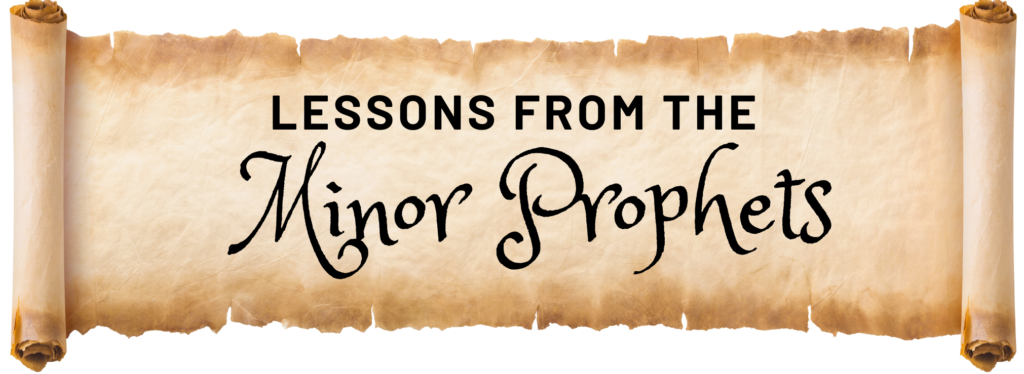Major Lessons from the Minor Prophets
The twelve books known as the Minor Prophets are named for their brevity rather than their significance. Gordon Fee and Douglas Stuart, in their co-authored work “How to Read the Bible for All Its Worth” (page 166), highlight that a small percentage of Old Testament prophecy relates to Jesus, an even smaller percentage pertains to the New Covenant age, and less than ONE percent focuses on future events.
The Hebrew term “nabi,” meaning “called,” was commonly used for prophets, emphasizing their divine calling and mission to speak on behalf of God. The distinction between forth-telling and foretelling is crucial in understanding the multifaceted role of prophets beyond their calling and proclamation to the people. Let’s take a look at these men and the lessons we still learn from them today.

The Minor Prophets address the Jews’ rebellion against God. Hosea served as a Hebrew prophet for over 40 years during King Jeroboam II’s reign in Israel (786-746 BC), a leader notorious for tolerating idol worship and fostering a culture of deceit, lies, and violence among his subordinates. For fourteen chapters, Hosea urges the Jews to acknowledge their wrongdoing and to rely on God rather than alternative beliefs, beings, or nations. Emphasizing God’s faithfulness and His desire for reconciliation with the Israelites, Hosea also warns of severe consequences, specifically the destruction of their nation, if they fail to recognize and turn away from their sinful choices.
Little is known about Joel, but it is likely that he belonged to the nation of Judah and lived in the 9th Century BC. This book is only three chapters yet those chapters highlight three key areas relevant across all time. First, rebellion against God and His design leads to inevitable negative consequences. Secondly, it emphasizes the importance of repentance—turning away from sin and seeking a clear conscience. Finally, the book of Joel underscores that a right relationship with God is still attainable despite past disloyalty. When individuals repent, God is dedicated to restoring what has been broken.
Amos also hailed from the kingdom of Judah but wasn’t officially recognized as a temple prophet. A fig farmer by trade, Amos likely penned his book between 760-750 BC. Despite his association with the people of Judah, Amos directed his prophecy towards the people of Israel. Amos uses his nine chapters to emphasize accountability and responsibility. He sternly warns of the dire consequences of wickedness, particularly their lack of respect for God and those who spoke with integrity. According to Amos, continuing a lifestyle of sin would lead to punishment and destruction.
The book of Jonah gives a vivid account of the prophet’s adventures as he goes against God’s directive to preach to the wayward Ninevites. Jonah goes to great lengths to avoid the task, even boarding a ship heading in the opposite direction, knowing that if they repent, God will forgive them. He repents from running away after being swallowed and later spit out by a great fish, but still reluctantly shares God’s message. Jonah’s experiences, as portrayed in the book, illustrate the inevitability of God’s plans, the transformative power of repentance leading to reconciliation with God, and the idea that no sin is beyond His redemption. They also teach us not to resent teaching those we think are less worthy of forgiveness.
Micah, a contemporary of Isaiah, delivers a powerful message to both Israel and Judah. He calls out social injustice, corruption, and idol worship. He predicts tough times for Samaria and Jerusalem but introduces a twist – a Messiah is coming! Micah emphasizes righteous living, kindness, and staying true to God. This book also calls us to stand up for what’s right, warns us about consequences, and reminds us of our hope.
Nahum provides a vivid portrayal of God’s impending judgment on the city of Nineveh. Despite its earlier repentance in response to Jonah’s warning, Nineveh has returned to its wicked ways. Nahum describes the city’s impending downfall and highlights God’s justice and sovereignty.
Habakkuk engages in a dialogue with God, questioning the apparent injustice and seeking understanding. God responds, emphasizing the importance of faith and trust in His plans. We also must learn to trust God’s wisdom even when circumstances seem unclear.
Zephaniah focuses on the “day of the Lord,” a time of judgment for both Judah and other nations. Amidst warnings of impending doom, Zephaniah offers a message of hope, encouraging repentance and the possibility of restoration for those who turn to God. He reminds us to take courage as mighty warriors. He comforts us by saying the Lord delights over us with singing!
Haggai discusses the rebuilding of the temple in Jerusalem. The prophet addresses the people’s neglect of God’s house and urges them to prioritize the reconstruction. Haggai emphasizes the importance of seeking God first and assures blessings for their obedience.
Zechariah combines visions and messages, covering a range of topics from the rebuilding of the temple to the coming Messiah. The prophet encourages the people to persevere in their faith, promising God’s future blessings and the arrival of the humble King.
Malachi concludes the Old Testament. After his words, there is a 400-year silence until the promised Messiah appears. Malachi addresses issues of spiritual apathy and unfaithfulness among the people. He challenges the people to return to genuine worship, emphasizes the importance of moral integrity, and foretells the coming of a messenger preparing the way for the Lord.
As you may notice, the lessons from these men are NOT small. These lessons weave together in a vibrant tapestry! They share the history while guiding the future. This spiritual wisdom encourages us to welcome repentance, champion justice, and anchor our trust in God. The threads of these teachings lead us to hope, redemption, and a lasting connection with the Lord.